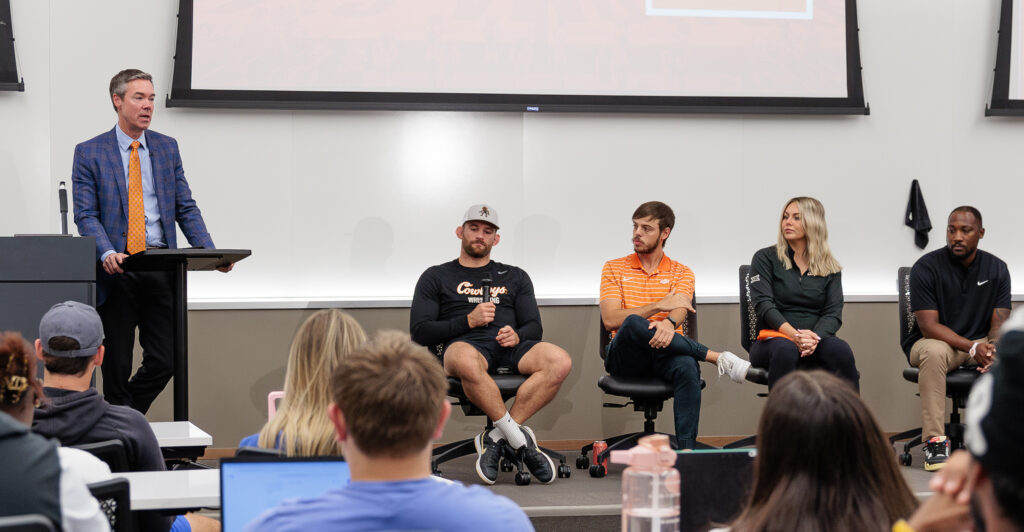Thursday, June 5, 2025
Media Contact:
Stephen Howard | Director of Marketing & Communications | 405-744-4363 | stephen.howard@okstate.edu
Chad Weiberg braced himself for the possibility of a tough crowd.
The Oklahoma State University athletic director had experience meeting with the most
influential leaders in college sports. But his job description didn’t mention keeping
a room of undergraduate students awake at 8 a.m. on a Monday.
He chose that part.
Luckily, his audience eased any nerves.
“From Day 1, they were into it and asking great questions and interacting,” Weiberg
said.
It’s rare to hear lively dialogue filling a college classroom before most people’s
morning coffee has had time to kick in, but nothing about this situation was ordinary.
For eight weeks in fall 2024, Weiberg carved Monday and Wednesday mornings out of
his jam-packed schedule to teach his first class, MKTG 4713, also known as Advanced
Sports Marketing.
“We asked him to teach the course,” said Dr. Maribeth Kuzmeski, an associate professor
of professional practice in the School of Marketing and International Business. “I
begged him to teach the course. Somehow, he said yes. An athletic director teaching
a course in the business school is unheard of.”
With bold, original ideas, Spears Business is preparing the next generation of sports
industry leaders.

his passions for sports and data.
An OSU business student can build analytical skills through fantasy football, visit
the headquarters of sports franchises nationwide and guide athletes with name, image
and likeness training. Students gravitate toward this immersive environment.
“Instead of being an athlete, I just wanted to see what it was like behind the scenes
of it,” Jaidan Dudley, a marketing student with a sports management minor, said.
The fast-paced industry is evolving in many ways. Revenue sharing will likely impact
college athletics as early as the 2025-26 academic year. Advanced metrics are reshaping
teams’ strategies from college to professional levels. NIL deals require financial
literacy.
Given these seismic shifts, it’s increasingly crucial for college athletic departments,
sports agencies and professional franchises to hire employees with business degrees.
Weiberg, who holds a bachelor’s degree in business administration and an MBA from
OSU, supports his alma mater’s approach to preparing students for these jobs.
To stay ahead, you can’t follow a playbook. You have to draw the game plan.
“Being willing to be open-minded and evolve and adjust to what’s going on out in the
real world is what brings the value into the classroom,” Weiberg said. “That’s what
Spears does really, really well.”
Sports marketing: a new option
The wheels were turning in Kuzmeski’s mind after lunch at The Hideaway in November
2022.
She met with Dr. Tom Brown, head of MIB, and Dr. Ken Eastman, then-dean of Spears
Business.
Weiberg sat at the table, too. Over pizza, they brainstormed ways for OSU Athletics
and Spears Business to work together. Weiberg knew where to focus the curriculum.
“The cost of competing continues to go up,” Weiberg said. “That’s why it’s so important
to be able to generate revenue in every possible way that you can, including, and
this is what makes it so exciting, ways we never thought of before.”
Two magic words — revenue generation — clicked with Kuzmeski, who created OSU’s Sports
Sales and Revenue Generation course. She had no idea her husband, Rich Kuzmeski, would teach it, but his sales background
made him the perfect candidate when he joined the Spears Business faculty in January
2023.
Student interest in sports revenue generation skyrocketed, and MIB responded.
In fall 2024, Spears Business unveiled its sports marketing and revenue generation
degree option, allowing marketing students to specialize in the growing field. Between
the Kuzmeskis and multiple lecturers from OSU Athletics, the sports marketing curriculum
is robust and far-reaching, covering topics from social media management to fan engagement
to NIL.
The Brand Squad, Maribeth Kuzmeski’s student group that assists OSU athletes with
NIL, enhances classroom lessons with real-world experience. In spring 2025, Spears
Business also established the CFO Squad, which pairs student-athletes with students,
professors, accountants and financial advisors for guidance on topics such as taxes,
savings and long-term financial planning.
Fewer than 20 years ago, sports education in Spears Business — like Oklahoma’s sports
scene — barely resembled the booming present.
“Being willing to be open-minded and evolve and adjust to what’s going on out in the
real world is what brings the value into the classroom. That’s what Spears does really,
really well.”
— Chad Weiberg, OSU athletic director
Sports management: the beginning
In 2007, when Dr. Bryan Finch joined the Spears Business faculty, OSU had one sports
business class without a permanent instructor.
About 50 miles southwest, Oklahoma City had no NBA team.
Both facts were about to change, and one boosted the other.
Finch, who had just earned his Ph.D. in sport management from Texas A&M University,
inquired about teaching opportunities at OSU.
There was no sport management program for him to join, but he could build one.
“They let me dream it up,” said Finch, the Spears Business director of sports management.
“All these things were new, and it was all started through the business school and
not tacked onto other things, so I think it gave us an advantage.”
The year after Finch arrived at OSU, the Thunder debuted in Oklahoma City, bringing
tremendous possibilities for students.
“It was like a blessing from above,” Finch said.
Since then, Spears Business students have worked closely with the nearby team, delivering
presentations, touring the arena and securing internships.
Dudley spent the fall 2024 semester as a marketing and community engagement intern
for the Thunder while volunteering with the Brand Squad.
“I’ve learned to network as much as possible and get those connections so you can
get your foot in the door,” Dudley said.
To help students make connections, Finch leads them on industry immersion programs
across the country, partnering with franchises from MLB’s Arizona Diamondbacks to
the NHL’s Minnesota Wild.
“Talking to the people in the industry, what they’ve told me over and over, especially
the last five or six years, is they need teamwork,” Finch said. “They need imagination.
They need creativity. They need problem-solving.”
Versatility also helps. Like Dudley, OSU junior Luke Melton has tailored a well-rounded degree plan to his interests. Melton, from Edmond, is a double major
in management (with an option in sports management) and marketing (with an option
in sports marketing and revenue generation).
A Cowboy basketball manager, he has a clear passion.
“I want to do something in sports, whether that’s coaching or the front office or
the analytics side,” Melton said.
Sports analytics: a dream takes shape
If Melton and Zach Cleveland walked into class ribbing each other about their fantasy
football matchup, they probably did their homework.
Whether you’re a data whiz, a sports fan or both, Dr. Evan Davis’ sports analytics
course is popular because of its interactive assignments.
Melton and Cleveland were students in the inaugural fall 2024 class, which started
with a fantasy football autodraft.
It might sound like a game, but the assignment involved serious business.
“A large proportion of them had already played,” said Davis, an associate professor
of professional practice in the Department of Management Science and Information Systems.
“It was something they could engage in and see that, yes, you can apply data analytics
to this thing that millions of people do. It just tries to make it a little more fun.”
The in-depth league analysis is only one aspect of the course, which introduces students
to professionals like Brian Jones, director of research and development for the Colorado
Rockies.
Dr. Rick Wilson, the MSIS department head, dreamed for years of bringing this Spears
Business course to life.
In the 1990s, years before the events that inspired baseball analytics movie “Moneyball,”
Wilson encountered skeptical attitudes about the place of sports research in academia.
That didn’t stop him from seeing the value or pursuing his passion to bring the topic
to the business mainstream.
Wilson was ahead of the curve. Today, he is a notable sports data scholar with his
research cited in a 2022 CNN article about NFL overtime rules and referenced repeatedly.

how to apply his data analysis skills to baseball and football.
With sports metrics influencing fields from management to marketing, the pieces for
Wilson’s ideal sports analytics course have fallen into place.
Wilson knew Davis, whose office contains sports memorabilia among a collection of
“Star Wars” trinkets and pop culture references, could present the topics in a way
that resonates with students.
Cleveland, a junior from Arlington, Texas, found inspiration in Davis’ class. Cleveland
is majoring in data analytics with a sports management minor, and he wants to work
for an MLB organization.
“For me, it’s extremely beneficial because I am so fascinated by the way he’s applying
these concepts to the data that I want to differentiate myself in the field of being
a data analyst,” Cleveland said. “I’m not just learning stuff I’m going to retain
for a test and then forget. This really feels like I’m building into my future.”
A pathway to the future
Weiberg recruited an all-star lineup of guest speakers for his class.
OSU graduate Jessica Presnall shared her expertise as the Big 12 Conference’s chief
legal and business affairs officer. Big 12 commissioner Brett Yormark joined the class
on Zoom. A panel of OSU Athletics employees visited in person.
Weiberg made a point to sometimes sideline himself and give the microphone to others.
After all, he landed his classroom gig because someone did that for him.
Rich Kuzmeski had invited Weiberg to be a guest speaker for Sports Sales and Revenue
Generation, paving the way for the athletic director to teach his own course with
support from the Kuzmeskis and marketing lecturers.
“I never dreamed that one day, instead of being in those chairs, I would be somebody
up front talking to students in my college,” Weiberg said. “But here I am.”
Story by: Hallie Hart | Engage@Spears magazine
Photos by: Adam Luther and Devin Flores



